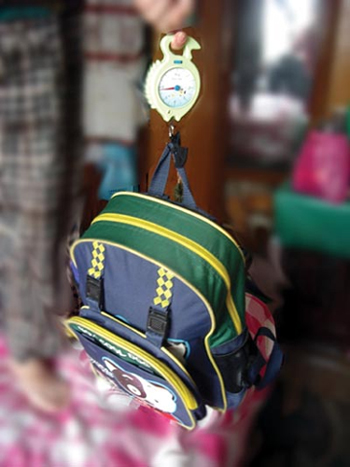'School-choosing fee' dissatisfies most Chinese people
School competencies vary greatly
Ms. Yan, who lives in Beijing's Haidian District, was overcome with regret because she didn't arrange a good middle school for her son before he graduated from primary school.
 |
|
The school bag of an ordinary student weighs 5.8 kilograms. |
"Good middle schools are few in number, so the competition is fierce. Most children started to take various training courses starting in the third year of primary school," Yan said. "I didn't know results of extracurricular examinations meant so much in school admission until my son was in grade five. I applied for an English training course for him, but he failed to pass the exam. I applied for some famous middle schools, but received no response. I would be glad to pay the 'school-choosing fee,' but there is no chance."
Ren Baoju, an associate professor of Beijing Youth Politics College, said that Beijing schools give first priority to students who have rankings in various competitions, such as the Olympic Math Competition, Spring Bud Writing Competition and PETS (Public English Test System). The middle school affiliated with Renmin University even requires its applicants to pass Grade 7 of GESE (Graded Examination in Spoken English of Trinity College London), an examination that fails many college students. Another way to earn credits is to become a "three good" student at the city level (an honorable title for outstanding students who display achievement in academics, morals and health).
"Only a handful of children can be chosen as 'three good' students at the city level, so most students have to study like crazy to get outstanding results in competitions," Ren said. The price of an English training course ranges between 1,500 yuan and 5,000 yuan, and some training centers can recommend excellent students to famous middle schools. Therefore, some parents register their kids in as many training courses as possible. Sometimes, although the fees have been paid, the kids have no time to attend the classes, so the parents will just force the kids to attend the competitions.
However, children who do well in the competitions are guaranteed nothing, as they are only qualified to receive an application. They must then take the entrance exam of their target school. No matter the results they get, they have to pay the "school-choosing fee." This practice is well-accepted in China.
According to the survey, 63.9 percent of the respondents regarded "the difference in schools' competencies" as the main reason for choosing schools. It was followed by "the pressure of entering college" (56.5%); "parents' overreaction to children's education" (55.5%)' "malfunction of a quality-oriented education policy" (48.8%); and "local governments' unbalanced investments in schools" (48.6%).
 0 Comments
0 Comments







Comments